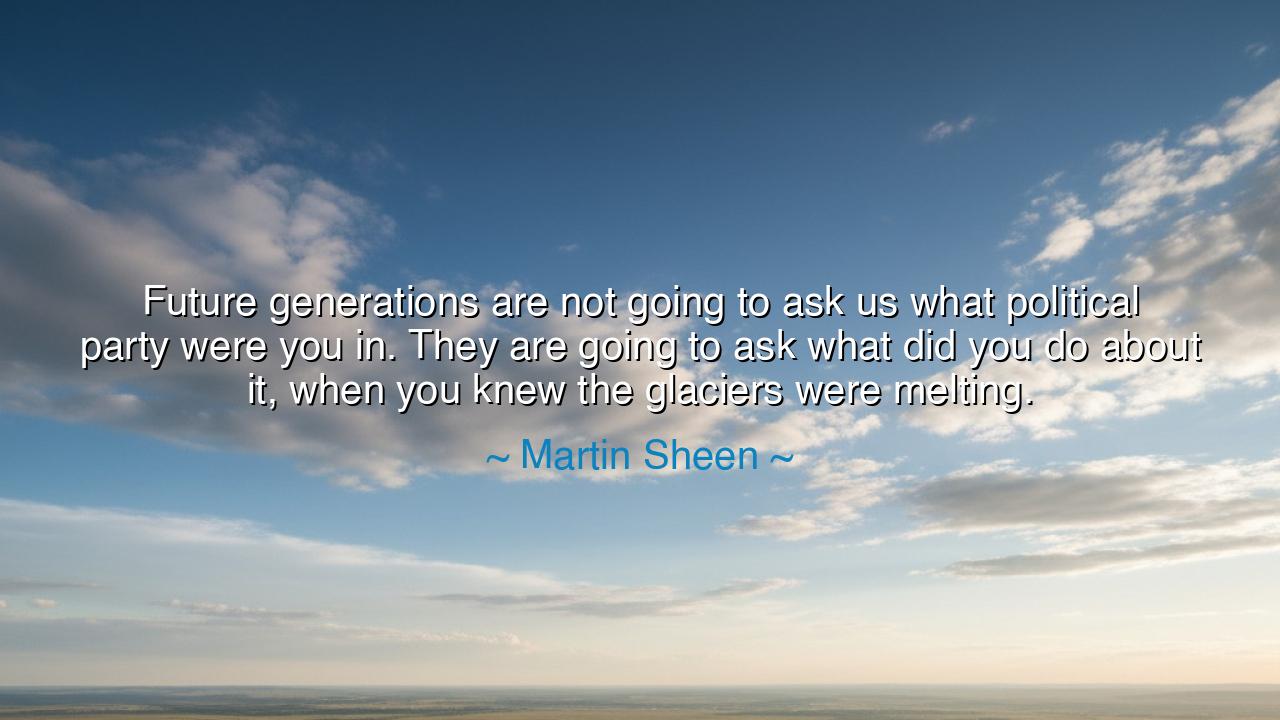
Future generations are not going to ask us what political party
Future generations are not going to ask us what political party were you in. They are going to ask what did you do about it, when you knew the glaciers were melting.






In the time of the ancients, when great civilizations flourished and fell, the wise ones often spoke of legacy, and how it is not measured by the wealth we accumulate or the power we hold, but by the actions we take in times of great need. They understood that history does not judge us by the titles we wear, nor the factions we belong to, but by what we do when faced with the challenges of our age. Martin Sheen’s words, “Future generations are not going to ask us what political party were you in. They are going to ask what did you do about it, when you knew the glaciers were melting,” carry the same message of responsibility and accountability for the actions of today.
This profound statement speaks to the heart of human responsibility. It is not enough to merely acknowledge the problems of the world; we are called upon to act. Just as the ancient philosophers warned their followers of the dangers of complacency, so too must we heed the same wisdom. The question posed by Sheen is not one about political division; it is a question about moral courage and action. In times of great crisis, it is not the labels we wear that matter, but what we do with the knowledge that we have. The glaciers melting, a metaphor for the many urgent environmental crises facing the world today, represents a global challenge that transcends the boundaries of politics, affecting all of humanity.
Consider the ancient Roman Empire, which thrived on the power and abundance of its territories. Yet, the great philosopher Seneca warned of the empire's moral decay long before its fall. He observed that the people of Rome, consumed with luxury and spectacle, ignored the deterioration of their own moral and ethical foundations. When Rome’s glory began to fade, it was not because the empire lacked wealth or power, but because the people, in their complacency, had neglected the action required to preserve it. They failed to act in the face of moral decay, and their empire crumbled. Sheen’s words remind us that we, too, are standing on the precipice of a crisis. The question is not whether we will face this challenge, but how we will respond.
Throughout history, there have been moments when the fate of civilizations hung in the balance, and the actions of individuals made all the difference. Consider Mahatma Gandhi, whose peaceful resistance against the British Empire did not rely on political alliances or power structures. He, too, faced the forces of empire, but his legacy is not defined by the political party he represented—it is defined by his resolve, his action in the face of tyranny, and his ability to unite a nation for a common cause. In the same way, Sheen’s message compels us to ask: What will we do when we face our own moment of moral reckoning? Will we allow political divisions to divide us, or will we rise above them, united in our shared responsibility to the world?
Future generations will not remember the political squabbles that dominated our time; they will remember what we did in the face of global challenges like climate change, social inequality, and the erosion of our natural world. Our actions—or lack thereof—will be what defines us. The glaciers are melting, and this is not just a statement about the environment, but a call to action for us all. Just as ancient societies left their legacies, we, too, will leave a mark. Will we be remembered for our inaction, our failure to rise to the occasion, or will we be remembered for our courage, for the steps we took to protect the world and serve future generations?
The lesson here is clear: do not wait for the perfect moment to act. The future will not judge us based on our good intentions or our hopes for change. They will judge us on what we did when we knew the truth, when we had the power to act, and when the consequences of inaction were laid bare before us. We must act with urgency, for the challenges we face are real, and time is fleeting.
In your own life, let this be a call to take action—not only in the political realm, but in every aspect of your life. When you see injustice, stand up. When you see suffering, extend a hand. Take responsibility for the world you are shaping, for the legacy you are leaving behind. The glaciers may be melting, but the choice to act is still in your hands. Choose to act, and ensure that you are remembered not for the party you followed, but for the courageous actions you took to protect the earth, to heal its wounds, and to preserve its beauty for the generations yet to come.






AAdministratorAdministrator
Welcome, honored guests. Please leave a comment, we will respond soon